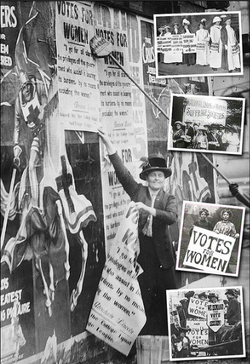
Charlie D, the writer who gave us A Christmas Carol, drew attention to children living in poverty and left his wife, Catherine Hogarth because she got a bit portly after over 10 pregnancies. I think I’d turn to a bit of cake if my new husband developed an uncomfortable passion for my younger sister too. Cake is uncomplicated and doesn’t force you to partake in annual performances of the play what it wrote.
But I fear we are full to the brim of Dickens trivia. Instead we at Squeamish Bikini would like to draw your attention to another anniversary today. On the 7th of February 1918 women over 30 who could be sensible won the right to vote.
Admittedly there seems to be a tradition in voting rights being laughably slow to catch up. In 1780 the electorate of England and Wales made up less than 3% of the population. In 1832 men who owned properties of a certain value were given the vote, 1 in 7 men met these requirements.
Various campaigns for universal suffrage came together in 1897 to form the National Union of Women’s Suffrage Societies. After years of meetings, publications and letter writing the NUWSS organised its first major procession. Over 3000 women marched from Hyde Park to Exeter Hall in 1907 in support of women’s suffrage.
By then Emmeline Pankhurst had already broken away from the NUWSS and formed the Women’s Social and Political Union. It was these women members who became known as the suffragettes.
The suffragettes got the publicity for women’s suffrage through militant methods, (stopping only at the outbreak of WW1 and contributing to the war effort) but it was the NUWSS who the coalition government negotiated with.
On the 6th of February, 1918, 21 years after the formation of the NUWSS, the negotiations and compromises were passed as the Representation of the People Act. Women over the age of 30 who met minimum property qualifications could vote.
The next day the Manchester Guardian reported: “We may mourn for what we had hoped for and have not got, but that need not prevent us from rejoicing at the gains which have been won.”
It wasn’t until 1928 (hemlines had risen above women’s knees before they could vote!) all women over the age of 21 won the right to vote.
I wonder if come February 2018 the BBC schedule will be concluding months of documentaries and dramas covering the subject of women’s suffrage.
Squeamish Kate
 RSS Feed
RSS Feed
